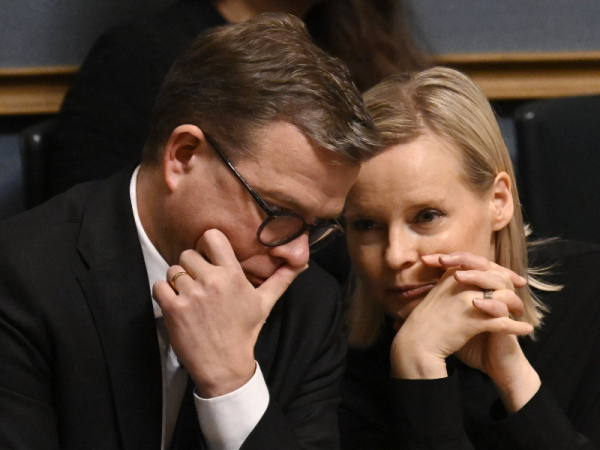
Prime Minister Petteri Orpo (NCP) and Minister of Finance Riikka Purra (PS) chatted during a plenary session in parliament on 21 February 2024. The Finnish government will today commence a two-day session with the goal of agreeing on significant spending cuts and tax increases. (Markku Ulander – Lehtikuva)
- Next Article Opposition roasts government over about-face on pensions
THE GOVERNMENT of Prime Minister Petteri Orpo (NCP) will start its two-day framework session today, looking to agree on spending cuts and tax increased worth a total of three billion euros to rein in the growth of public debt.
The framework session will also produce the general government fiscal plan for 2025–2028.
Helsingin Sanomat on Sunday revealed, citing to Ilta-Sanomat that the government will raise the general value-added tax rate from 24 per cent but stopped short of specifying the extent of the raise. A one-percentage-point increase, which has been the subject of much speculation, would generate 615 million euros in tax revenue, according to Helsingin Sanomat.
The value-added tax on food will not be adjusted from 14 per cent, Orpo added to Ilta-Sanomat. Also goods such as books, magazines and medications are subjected to a lowered value-added tax rate, 10 per cent.
The government is also expected to weigh up other tax increases. Minister of Finance Riikka Purra (PS) has previously floated the possibility of raising the taxation of electric vehicles and adopting various health-based taxes to raise the prices of unhealthy products.
Helsingin Sanomat on Sunday wrote that many of the spending cuts are expected to target the social and health care sector.
The government intends to raise service charges on the clients of hospitals and health care facilities and adjusting the staffing requirements in elderly care from the current level of one nurse for 20 elderly people. Information obtained by the newspaper also suggests that the government has considered the possibility of modifying the care guarantee in basic health care.
State subsidies of social and health care associations could be slashed by around 100 million euros or 25 per cent. More than 11,000 social and health care associations are currently operating in the country, providing services that supplement the public offering for certain patient groups. They have a major role in, for example, adolescent psychiatry and substance abuse treatment.
Aleksi Teivainen – HT
- Next Article Opposition roasts government over about-face on pensions
Source: www.helsinkitimes.fi
